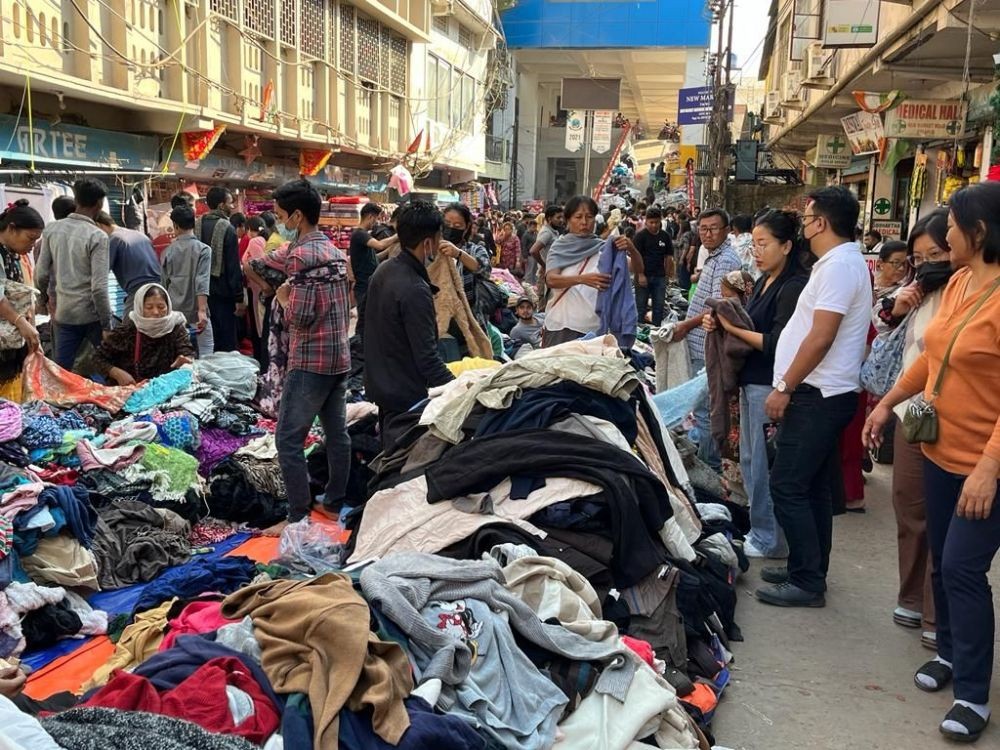Shoppers throng a flea market in Nagaland’s state capital Kohima. (Morung Photo)

Vibi Yhokha Sophie
Kohima | April 22
Nagaland is no stranger to thrifting, counting decades since it was first introduced to the state’s population. However, of late, the practice of thrifting is gaining higher ground with a growing consciousness among the younger generation on the ‘sustainability’ of the practice and being kind to earth.
In a nutshell, thrifting is the process of reusing pre-owned, upcycled or thrifted items of clothing and accessories. In other words, it means shopping at a thrift store or flea market for used products at a reduced price.
With concern over the economic and environment impact of fast fashion, a more environment conscious generation of today is slowly shifting to thrifting not just to save money but to ensure a more sustainable future.
“Secondhand bales unless distributed to sellers find their way to landfills which are detrimental to the environment. So thrifting is not just important for the people because of the clothes but it is also important for the earth that we occupy,” says 23 years old Jungshinungsang Imti, an MA English student at the University of Hyderabad.
Ididaule Ngia, Founder of LOHA TINA and NAGAHAAT, both non-profit initiative focused on thrifting and attempts to “give a second life” to wastes and used items through 'reuse, recycle and resell', notes that fashion waste is one of the biggest waste. They are either dumped thereby requiring decades to decompose or incinerated to produce more greenhouse gasses.
“The only good way is to re-use or upcycle fashion wastes. We at NAGAHAAT upcycle wastes from sewing houses and turn them into home furnishes or kitchen essentials and sell them at reasonable prices in the market,” says Ngia and considers it the most budget friendly initiative one could begin with fashion wastes.
According to Imti, thrifting has helped so many homes stay afloat economically and has ensured uncountable families remain clothed appropriately in all seasons of the year.
Although thrifting has always been an integral part of the modern Naga individual, Imti rues that thrifting is yet to be “considered a cultural connotation with regard to the Nagas but rather seen as an activity for a lower section of the society to engage in and that stands as a testament to Naga ignorance”.
Imti also regards thrifting in Nagaland as a “very rare case of ignorance unfolding positively”, with Nagas constantly engaging in this practice not realising their contribution to the earth’s sustainability.
Meanwhile, Ngia reminds that Nagaland is no stranger to climate change where activities such as unplanned development and deforestation is affecting the healthy ecosystem in the State.
The Earth Day 2023 theme 'Invest in our Planet' calls for partnership with businesses, governments, and citizens around the world on the need to invest in our planet to improve our environment and provide a better and safer future.
In this regard, Ngia notes that the most important investment is in “educating fellow citizens the criticality of climate change that the planet is experiencing”. While a single contribution might not impact the Earth's sustainability, Ngia is optimistic that “with little effort from individual and spreading awareness, we can all be imperfect environment caretakers.”
Ngia also expressed hope that Nagas will invest their creativity and time in finding new solutions and sustainable business models for everyday issues that are degrading the environment citing solutions such as creative packaging solutions, organic gardening and produce etc- solutions not just to protect the environment but also ensure a self reliant community.
“Thrifting as a whole, can be seen as a shaped object with all sides equally beautiful in the sense that every aspect of thrifting is beneficial to one person or the other and as such should definitely be a practice that is opened up to and taken up if not for personal style but definitely for sustainability,” advocates Imti.






